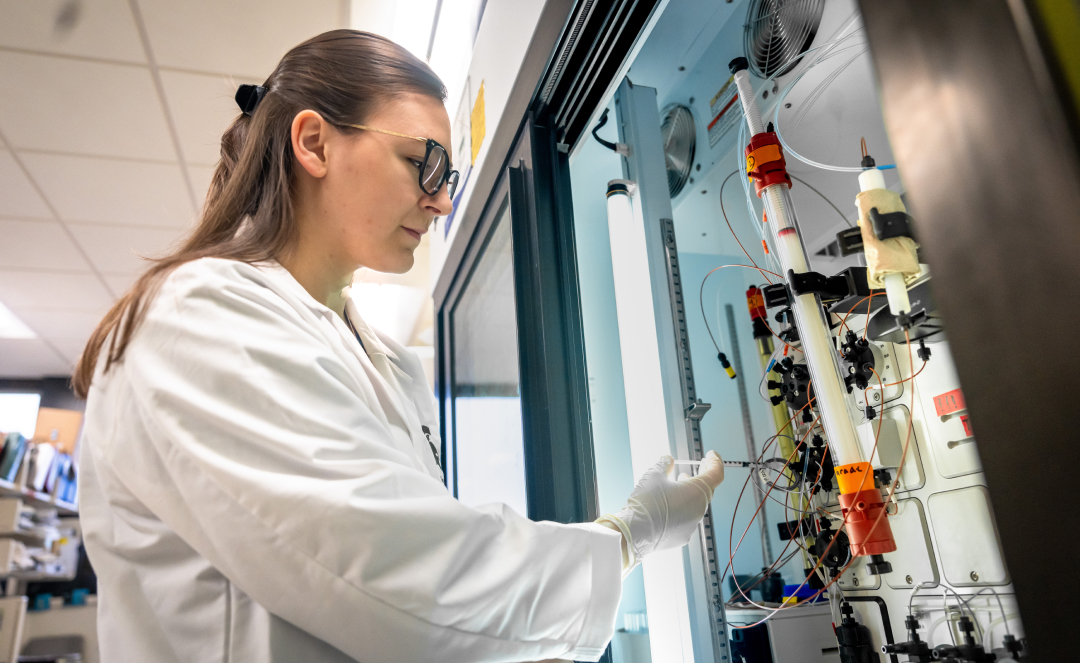Why this matters:
- MSU is a leader in osteopathic medicine education, with more than 70% of its graduates staying in Michigan to care for patients.
- The D.O.-Ph.D. program trains future physician-scientists, doctors who treat patients and conduct important medical research.
- This program helps solve real health problems and strengthens Michigan’s leadership in science, health care and education.
The Michigan State University College of Osteopathic Medicine has achieved an important milestone, becoming the first osteopathic medical school to be included in the prestigious National Institutes of Health Medical Scientist Training Program, or MSTP.
This award officially recognizes MSU’s D.O.-Ph.D. Physician-Scientist Training Program as one of the top dual-degree programs in the U.S., elevating its influence in the biomedical research community. The MSTP is one of the most competitive medical education programs and provides funding and support for students pursuing dual medical and research degrees.
“Osteopathic medicine is a cornerstone of Michigan State University’s commitment to advancing health and healing in Michigan and beyond,” said MSU President Kevin M. Guskiewicz, Ph.D. “The inclusion of our D.O.-Ph.D. students in the NIH Medical Scientist Training Program reflects not only the excellence of their dual training, but also MSU’s leadership in reimagining the future of medical education and biomedical discovery. This achievement underscores the national value of osteopathic medicine — and MSU’s role in shaping it.”
Scientific research provides doctors with the knowledge and solutions needed to help prevent disease, as well as diagnose and treat patient illness and injuries. The D.O.-Ph.D. program is for students who are interested in practicing osteopathic medicine and conducting research.
“Earning a place in the NIH’s Medical Scientist Training Program is an extraordinary accomplishment — it’s one of the most competitive designations in academic medicine,” said Joyce deJong, D.O., dean of the MSU College of Osteopathic Medicine. “That MSU is the first osteopathic institution to achieve this speaks volumes about the strength of our research enterprise and the excellence of osteopathic medicine. It proves that at MSU, osteopathic medical education doesn’t just belong in the room — it leads.”
“Osteopathic physician-scientists bring unique perspectives to both research and patient care,” said John Goudreau, D.O.-Ph.D., a graduate of the program, its co-director and associate dean of research at the college. “Their work often leads to breakthroughs in therapies, diagnostics and medical technology that improve community health.”
The growing role of D.O.s in health care
Across the U.S., more students are choosing to become a doctor of osteopathic medicine, or D.O. Today, 28% of all medical students are in osteopathic programs. In Michigan, more than half of all primary care physicians are D.O.s, and many of them graduated from MSU. D.O.s are fully licensed physicians who treat patients, prescribe medicine and perform surgery. What sets them apart is their training in osteopathic principles.
Osteopathic medicine is known for its whole-person approach to wellness and care. D.O.s look at the connection of the body, mind and spirit when caring for patients. The integrative whole-person approach of osteopathic training is a compelling complement to the disease-focused approach to training in biomedical science research. D.O.s learn osteopathic manipulative medicine and osteopathic manipulative treatment.
All D.O.-Ph.D. students at MSU are fully funded
In another trailblazing step, MSU’s D.O.-Ph.D. program became the first of its kind to be fully funded in 2024. Students pay no tuition and receive a living stipend and health benefits.
“Fully funding our students was a game changer,” said Brian Schutte, Ph.D., co-director of the program. “It makes the path to becoming a physician-scientist more accessible and helps ensure a diverse group of future medical leaders.”
A strong tradition with a bright future
The MSU College of Osteopathic Medicine has graduated over 8,000 D.O.s, including 83 physician-scientists. Each year, the college recognizes roughly 300 graduates, with an average of 70% choosing to stay and practice in Michigan — many in areas with limited access to health care.
U.S. News & World Report recently ranked the college No. 2 in the nation for graduates working in primary care and No. 3 for those serving in health professional shortage areas.
MSU’s selection into the NIH MSTP not only affirms its legacy of excellence in education and research but also signals a transformative shift for osteopathic medicine in the broader medical and scientific community.
